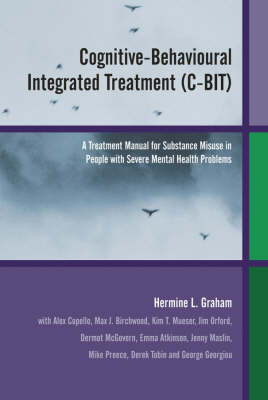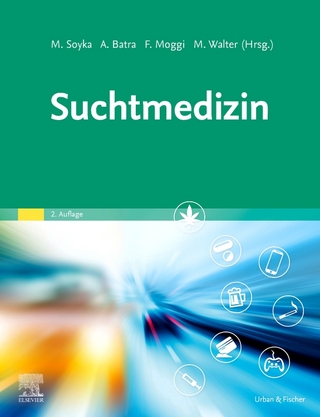
Cognitive-Behavioural Integrated Treatment (C-BIT)
John Wiley & Sons Inc (Verlag)
978-0-470-85437-2 (ISBN)
This exciting new book addresses the important issue of how to provide integrated mental health and substance misuse treatment of individuals with these co-occurring disorders. Combining both theory and practice, by the use of illustrative clinical case material, it provides a survey of different approaches to the integration of mental health and substance misuse services. A unique collection of chapters, from authors who are experts in the field and pioneering innovative approaches, provides an international perspective (including UK, Germany, Australia, USA, Canada) of treatment. Arranged in five sections, Section 1 provides an introduction to the issue of substance misuse amongst those with psychosis. Section 2 introduces a range of integrated service models from different countries. The third section provides a practical hands-on guide to assessment and treatment. The fourth section addresses the specific treatment needs of special population groups (including young people, forensic groups, homeless people and those with HIV/AIDS). The final section examines treatment outcome studies and implications for the future.
Clinical psychologists, psychiatrists, nurses, case managers, and psychiatric social workers in training and practice in clinic, hospital and community settings will find this book an essential practical resource for working with individuals (and their families) with co-occurring disorders.
Dr Hermine L. Graham is a Consultant Clinical Psychologist and Lecturer on the Doctorate in Clinical Psychology course at the University of Birmingham, UK. She has led a programme of collaborative research and service innovation in the NHS focused on the integration of substance misuse treatment into mental health services.
About the Authors. Aims of the Book.
Acknowledgements.
PART ONE: INTRODUCTION TO COGNITIVE-BEHAVIOURAL INTEGRATED TREATMENT (C-BIT).
1. Issues in Working with those with Coexisting Severe Mental Health Problems Who Use Substances Problematically.
The Nature of Coexisting Severe Mental Health and Alcohol/Drug Problems.
Models of Comorbidity.
Obstacles to Treatment and Behaviour Change.
Treatment Needs.
2. Overview of C-BIT Approach.
Objectives.
Structure.
How to Know When to Move on to the Next Phase.
Treatment Sessions.
3. Overview of C-BIT Theory and Techniques.
Brief Introduction to Cognitive Therapy.
Cognitive Therapy Techniques in C-BIT.
PART TWO: COGNITIVE-BEHAVIOURAL INTEGRATED TREATMENT (C-BIT).
C-BIT CORE COMPONENTS
4. Assessment Phase: Screening and Assessment.
Clinical Assessment of Drug/Alcohol Use.
Assessment and Screening Tools.
Case Formulation.
Treatment Planning.
5. Treatment Phase 1: Engagement and Building Motivation to Change.
Strategies to Increase Engagement.
How to Put Drug/Alcohol Use on the Agenda.
Building on Motivation for Change.
Dealing with Resistance.
Identifying Social Networks Supportive of Change.
Finances/Money Management.
6. Treatment Phase 2: Negotiating Some Behaviour Change.
Identifying and Setting Achievable Harm-Reduction Goals.
Working with Resistance to Goal Setting.
Identifying Activities of Interest.
Engaging the Client’s Interest in the Activity.
How to Build Social Networks Supportive of Change.
Strategies to Increase Awareness of Problematic Links Between Mental Health and Substance Use.
7. Treatment Phase 3: Early Relapse Prevention.
Formulating Problems: Cognitive Model of Substance Use.
Relapse Prevention: Helping Your Clients Manage Their Substance Use.
Relapse Prevention: Including Social Network Member(s).
Coping with Cravings and the Abstinence-Violation Effect.
Relapse Prevention: For Substance Use and Its Links with Mental Health.
8. Treatment Phase 4: Relapse Prevention/Relapse Management.
Including Social Network Member(s) in Relapse Prevention.
Identifying a Relapse Signature to Psychotic Relapses and Role of Substance Use.
Developing a Comprehensive Relapse-Prevention/Relapse-Management Plan.
Using a Comprehensive Relapse-Prevention/Management Plan—Relapse Drill.
ADDITIONAL TREATMENT COMPONENTS I—SKILLS BUILDING.
9. Coping with Different Moods: Anxiety.
The Role of Substances in Creating or Maintaining Anxiety.
Starting Out: Assessing Anxiety.
Strategies to Manage Anxiety.
10. Coping with Different Moods: Anger and Impulse Control.
The Role of Drugs/Alcohol in Creating/Maintaining Anger.
The Role of Psychosis in Creating/Maintaining Anger.
Starting Out: Assessing Anger.
Strategies to Manage Anger.
Impulse Control.
11. Coping with Different Moods: Depression.
The Role of Drugs/Alcohol in Creating and Maintaining Depression.
The Role of Psychosis in Creating/Maintaining Depression.
Starting Out: Assessing Depression.
Strategies to Manage Depression.
12. Communication: Social Skills.
Social Skills.
Social Skills Training for Mental Health Problems and Substance Use.
Social Skills Training.
Applying Social Skills to Specific Situations.
Assertiveness.
Assertiveness Training.
Strategies to Tackle Lack of Assertiveness.
Applying Assertiveness Skills to Specific Situations.
13. Self-Esteem.
Effect of Low Self-Esteem on Mental Health and Drug/Alcohol Use.
Effects of Psychosis and Drugs/Alcohol on Self-Esteem.
Starting Out: Assessing Self-Esteem.
Strategies to Improve Self-Esteem.
14. Lifestyle Balance.
Strategies to Encourage Lifestyle Balance.
Increasing Activity Levels.
Time Management.
Money Management.
ADDITIONAL TREATMENT COMPONENTS II—FAMILIES AND SOCIAL NETWORK MEMBERS.
15. Working with Families and Social Network Members.
Provision of Psychoeducation.
Encouraging Involvement.
Practical Coping Strategies and Skills.
PART THREE: IMPLEMENTATION ISSUES.
16. Implementation Issues.
Overview.
Implementation Obstacles and Solutions.
Training and Supervision (Capacity Building).
Organisational Factors.
Overview of the Evidence Base and Future Directions for Research.
Appendices.
References.
Index.
| Erscheint lt. Verlag | 22.10.2003 |
|---|---|
| Co-Autor | Alex Copello, Max J. Birchwood, Kim T. Mueser, Jim Orford |
| Verlagsort | New York |
| Sprache | englisch |
| Maße | 175 x 252 mm |
| Gewicht | 680 g |
| Themenwelt | Medizin / Pharmazie ► Gesundheitswesen |
| Medizin / Pharmazie ► Medizinische Fachgebiete ► Suchtkrankheiten | |
| Sozialwissenschaften ► Soziologie | |
| ISBN-10 | 0-470-85437-5 / 0470854375 |
| ISBN-13 | 978-0-470-85437-2 / 9780470854372 |
| Zustand | Neuware |
| Haben Sie eine Frage zum Produkt? |
aus dem Bereich


